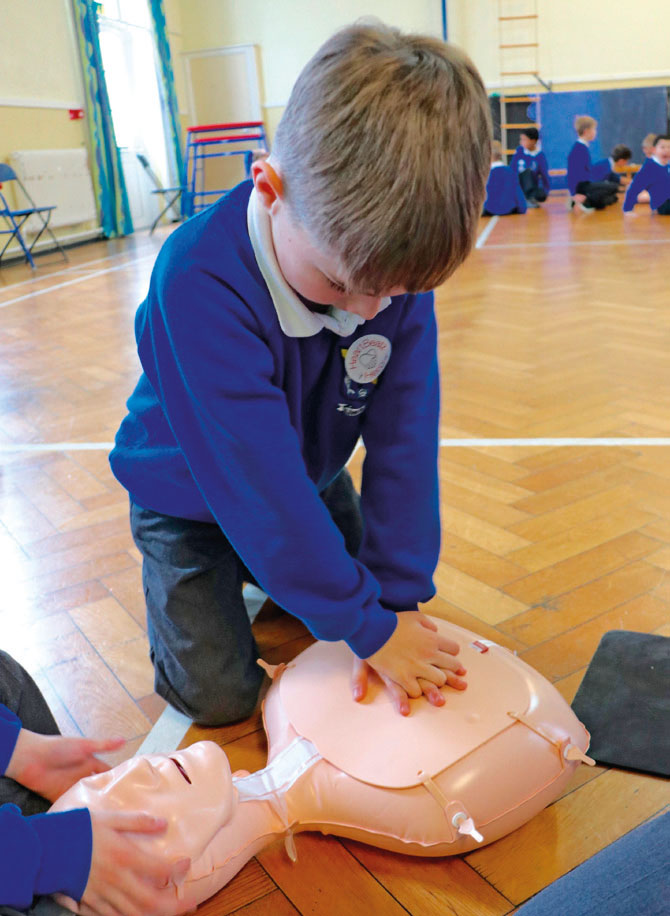
Music educators have long been making the case that the work we do has benefits far beyond the musical. Many claims have been made – including the notion that learning music can enrich children's understanding of other curriculum areas and help them to develop social skills, and even can help to prevent adults from developing Alzheimer's disease. One of Portsmouth Music Hub's recent projects makes the most compelling claim of all: music education could save lives.
Nominated for a Music Teacher Award for Excellence in Primary/Early Years, It's CPR is an initiative bringing together medical knowledge, rhythm and musical creativity. It trains children in cardiopulmonary resuscitation (CPR) using music, and aims to provide the tools to enable teachers, parents, children and medical professionals to work together to learn life-saving skills.
Lifesaving treatment
In 2016, a group of local medical professionals met with the hub to discuss how to increase schools’ engagement with CPR training. Music is a natural fit; medical professionals have long used familiar tunes when training the public in CPR.
Leilah Dare is an emergency medicine consultant in Bristol, and she knows the value of music when helping people recall information under pressure. ‘I always say The Archers or “Another One Bites the Dust”!’ she told me.
‘CPR is life-saving treatment. The situations that call for CPR are unusual and stressful events. When we're stressed and anxious we often forget things. Having music to remind us of what we need to do helps us remember. Also, the speed of chest compressions is very important – compressions to the beat of a tune help get the best results.’
The It's CPR songs all have a tempo of 100 to 120 beats per minute – the speed recommended by the European Resuscitation Council and the British Heart Foundation. ‘Keeping the beat through singing, music and CPR is really cool and I might save someone's life,’ says eight-year-old Max, one of thousands of children who have been involved in the training.

The pupils are taught by medical professionals
Iain Gilmour, composer and head of Isambard Junior School in Portsmouth, is behind the It's CPR songs and rap – he and the children at his school have been involved from the start. ‘The CPR song has become a kind of unofficial school song,’ he told me. ‘The children always request it – and those who haven't done the training are always asking when they're going to start.’
He's still struck by the power of music to make information stick – ‘I realised I know how to use a defibrillator – the song just starts playing in my head’ – but he certainly felt a great responsibility when writing the songs. ‘My songs are usually pretty tongue-in-cheek and funny,’ he says. ‘I realised when I was out walking the dog that this was really very serious – if I got this right it really might save a life.’
Gilmour is keen to stress that his compositions are just a small part of the project. ‘So many worked on this – the recording and editing, the resources. It was exciting to send my demos to the hub and receive a professional version.
‘The best thing is that this is all now available for any school to use – for free.’
HeartBeatz Heroes
Children – and indeed adults – might easily be intimidated by the seriousness of the subject matter, and the project aims to make sure the children have fun while learning lifesaving information. One of the parents who nominated It's CPR for the MT Awards is also a medical professional, and was struck by the children's enjoyment.
‘My son's enthusiasm has been testimony in itself to the effectiveness of this excellent project. His favourite song is the CPR rap and he can say “cardiopulmonary resuscitation” without even thinking. He's proud to call himself a HeartBeatz Hero and there's a song about this too, which he sings with real gusto.’
Teachers have also found It's CPR to be very effective. ‘I've often used music as a way to help children retain important information,’ says one Key Stage 2 teacher based in Portsmouth. ‘The resources have been well received by all the children, many of whom have English as an additional language.’
‘Some of the children were fearful to begin with,’ says another primary teacher. ‘They felt relieved once they'd learned the skills to save someone's life. We now have 420 in the Portsmouth community who are trained to help someone if they need CPR – and we still play the songs in assembly as the children love them so much.’
Parents and grandparents also report that children can't stop singing the songs. ‘We have friends who've suffered heart attacks,’ says Linda Reason, whose seven-year-old granddaughter participated in It's CPR training. ‘Anything that can be done to teach young people life-saving skills is to be applauded.’




